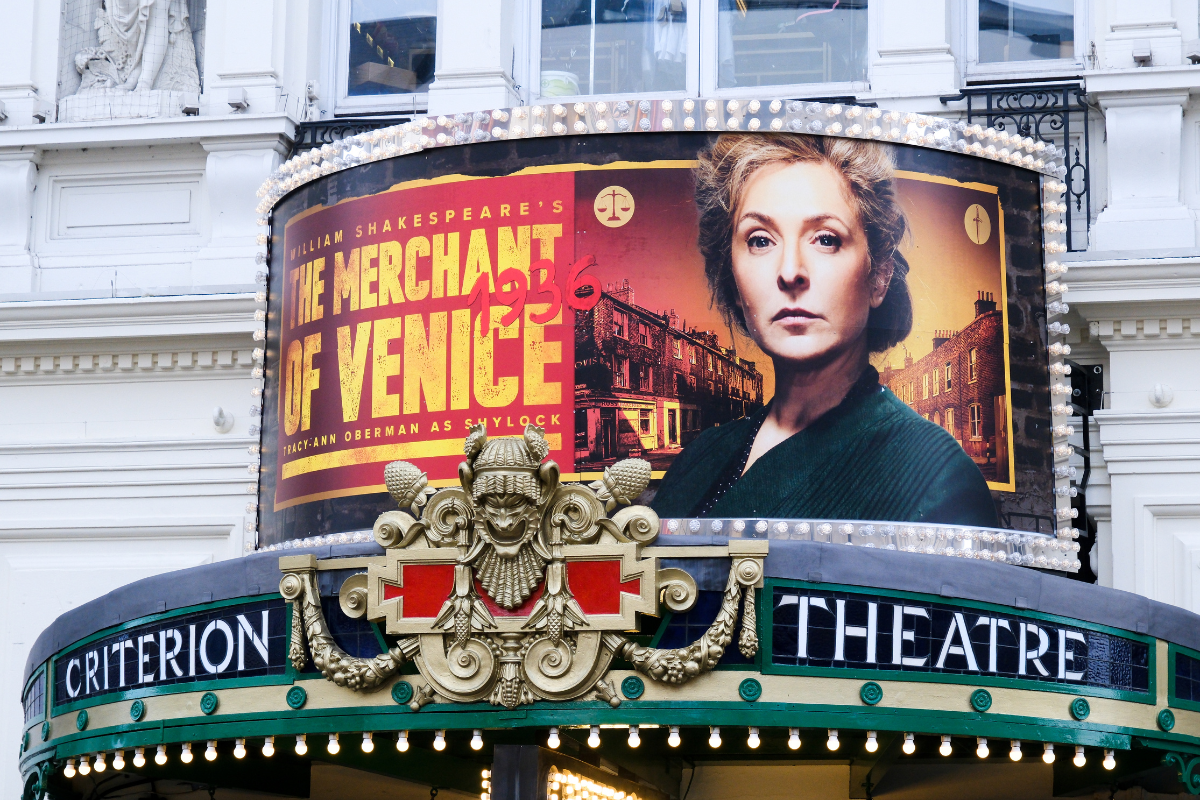I recently had the thought-provoking and ultimately deeply unpleasant experience of seeing “The Merchant of Venice 1936,” produced by and starring Tracy Ann Oberman. The show’s misguided attempt to not only reimagine Shakespeare’s infamous Jewish villain Shylock, but also to do so against the backdrop of rising fascism in the UK in the 1930s was messy and hard to watch, and set me thinking about whether this play, and plays like it, can be ethically adapted and performed.
In Shakespeare’s “The Merchant of Venice,” Shylock is a Jewish moneylender whose insistence that protagonist Antonio fulfils his bond with the “pound of flesh” he promised is the pivotal conflict in the play. Characterised as greedy, scheming, merciless and vengeful, Shylock represents the contemporary Shakespearean understanding of Jewishness, and has become emblematic of antisemitism within British theatre tradition. In this production, Shylock, played by Tracy Ann Oberman, is a single mother in the East End, a reconceptualization of the role inspired by Oberman’s great-grandmother and Oberman’s desire to tell the stories of these Jewish matriarchs who lived through a time of horrific prejudice and danger. Theoretically, and from a distance, this all sounds like it could work: take a famous Jewish villain and use their theatrical legacy to reconsider modern examples of antisemitism. However, push it even a little, and the whole concept crumbles completely.
There is an ongoing debate as to whether this play, and other plays which are constructed on prejudice and impossible to separate out from those principles, should be put on at all. In a culture of revivals and of re-interrogating historic works, the impulse to return to pieces such as this and modernize or reimagine is a fervent one. However, to offer a very brief and limited summary of a very complex question, I would say that I genuinely cannot imagine an ethical, sufficiently socially conscious production of “The Merchant of Venice.”
That is by no means to say that the work is worthless. It is an artifact, and a work of literature, and to erase the legacy of antisemitism that exists in our cultural history would be deeply irresponsible. And beyond the dangers of pretending it doesn’t exist, there is active value to be found when attention is given to understanding the context in which it was written: neither Shakespeare nor his audience are likely ever to have met a Jewish person, and therefore “The Merchant of Venice” functions as a testament to the pervasive narratives of antisemitism in an England that had been devoid of a practicing Jewish population for centuries. As a historical record and proof of an entrenched cultural hatred, this play is worth keeping an eye on.
There is a difference, however, between studying something as all of the above and watching it play out in front of you. The separation between page and stage is a crucial one. While it can be interesting to question the difference between an antisemitic play and a play about antisemitism, it is actually quite difficult to draw a line between these things when the play is simply being performed. So much of the nuance that can be achieved through close literary analysis is lost when the text is brought to life.
Antisemitism is foundational to “The Merchant of Venice;” it is a fundamental, intrinsic aspect of the play which is impossible to separate either from the text or its legacy. Shylock is a caricature, and a horrible one at that. In words on the page, this can be torn apart; this can be scrutinized and contextualized and seen as the communication of a wider message. The distance between the reader and the text is colossal and deeply protective. Imagination is key: Each individual pictures their own Shylock, and while there may well be harmful stereotypes that contribute to this conjuring up of a mental character, it doesn’t permeate the real, concrete world. You can close the book. The material is pacified by its firm limits.
When the antisemitism essential to the text must be translated to the stage, this becomes a lot more complicated. Every decision is loaded and incredibly important. In this production, we see Shylock with a penchant for fur coats and a dubious, vague Eastern European accent. Despite an asserted intention to reimagine the character, this still feels like a caricature. In the horrible scenes in which other characters go on antisemitic tirades, there is no language analysis to shield the audience from how harrowing this is. And even more insurmountable than the antisemitism by other characters is the antisemitism on the part of the play itself. The happy ending, where our three couples find marital bliss, involves Shylock converting to Christianity. How on earth do we get around this?
The production tied itself in utterly incoherent knots trying to do so. In a jarring and incongruous U-turn, after the weddings and Shylock’s condemnation to conversion, Oberman’s version has the bigoted characters rush to put their kippahs on and urge the audience to stand up (to literally stand up — we were encouraged to get up out of our seats!) against fascism. Within the plot, it makes no sense. And within the larger context of what the play is trying to do, it is maybe even more bizarre. What could have been quite powerful feels hollow and under-considered, because the method is so confused. The play attempts to comment on 1930s antisemitism (and, arguably 2020s antisemitism) using 1590s antisemitism as a conduit, but has made a crucial category error in doing so. “The Merchant of Venice” simply cannot be a viable vessel for this message, because it is impossible to make such an antisemitic text into an empowering performance. It was doomed to fail from the opening line.



